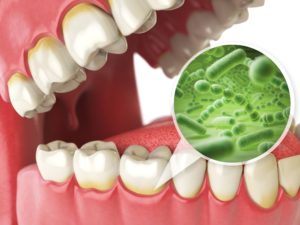 Did you know cavities aren’t the only threat to your oral health? Gum disease in Rochester is a leading cause of tooth loss. The Centers for Disease Control and Prevention estimates that 50% of Americans have the infection. It’s caused by bacteria found in plaque buildup from poor oral hygiene; however, genetics can also play a role. According to a recent study by the University of Pittsburgh School of Dental Medicine, there’s a connection between advanced gum disease and genetics. Here’s what you need to know to keep your gums healthy despite your genes.
Did you know cavities aren’t the only threat to your oral health? Gum disease in Rochester is a leading cause of tooth loss. The Centers for Disease Control and Prevention estimates that 50% of Americans have the infection. It’s caused by bacteria found in plaque buildup from poor oral hygiene; however, genetics can also play a role. According to a recent study by the University of Pittsburgh School of Dental Medicine, there’s a connection between advanced gum disease and genetics. Here’s what you need to know to keep your gums healthy despite your genes.
Is Gum Disease Hereditary?
The study found patients with certain genetic variations with beta-defensin 1 (DEFB1) were more vulnerable to oral bacteria and debris. They discovered an increased risk of both decay and gum disease, which can lead to tooth loss.
Although patients with a family history of gum disease can be prone to the infection, oral hygiene is a more influential factor. Ultimately, it results from plaque accumulations, which significantly increases your risk of poor gum health.
What is Gum Disease?
Gum (periodontal) disease is an infection of the gum tissue that can spread to surrounding oral structures without any treatment. Initially, tartar and plaque irritate the gum tissue, causing redness, swelling, and bleeding. This is the earliest stage of the infection, called gingivitis. It’s easy to treat without causing any long-term damage.
However, if the infection progresses, it can destroy the supporting structures of your teeth, causing them to loosen and fall out. Not only is tooth loss a concern, but advanced gum disease can also affect your general health. Researchers have found multiple connections between gum disease and certain health issues, like heart attack, Alzheimer’s disease, respiratory infections, and diabetic complications.
Safeguard Your Gum Health
No matter your genetics, you can protect your gum health with a solid oral hygiene routine at home. Use a soft-bristled toothbrush and nonabrasive toothpaste to clean all surfaces of your teeth for 2 minutes twice daily. Use high-quality dental floss to clean between each tooth at least once per day. Use an antimicrobial mouthwash to kill any bacteria left behind by brushing and flossing.
It’s equally important to visit your dentist every 6 months for a cleaning and checkup. Besides cleaning your teeth, they’ll monitor your gum health to detect gum disease early. Your dentist will also recommend living a healthy lifestyle, like limiting your sugar consumption, not smoking, and moderating how often you have alcohol.
With the right care at home and the experience of a qualified dentist, you can invest in a healthy mouth and body by keeping gum disease at bay.
About Dr. Nicholas Brong
Dr. Brong earned his dental degree at the University of California in San Francisco. He continued his education in advanced services, including periodontal therapy and gum surgeries. Dr. Brong is a member of various professional organizations, including the Minnesota Dental Association and the American Dental Association. If you have signs of gum disease, contact our office today to request an appointment.





